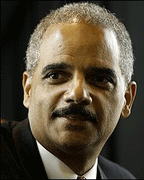
TAIPEI, Taiwan: – Behind-the-scenes efforts by lobbyists who tried to get Justice Department leaders to soften an ethics report that criticizes lawyers who supported harsh interrogation techniques seem to have paid off.
A government official told The Washington Post this week that an internal Justice Department investigation concluded that the Bush administration lawyers committed serious lapses of judgement in writing secret memoranda authorizing brutal interrogation, but should not be prosecuted.
A Newsweek report in April said that the White House was divided after the President Barack Obama administration accepted a recommendation from Attorney General Eric Holder to declassify and publicly release three 2005 memos.
The documents detailed harsh interrogation techniques approved for the CIA to use against Al Qaeda suspects.
People for the American Way, an organisation “dedicated to making the promise of America real for every American”, said, “The memos attempted to justify brutal treatment of detainees, including slamming subjects against wall, striking them repeatedly in the face and abdomen, confining them to small boxes, and threatening them with stinging insects.”
The organization’s president Michael B. Keegan issued a statement, saying that although Americans “knew that the Office of Legal Counsel went out of its way to condone torture during the Bush years, it is still shocking to see these memos in black and white”.
“They constitute a concerted attack on our laws and on our deepest values. The White House should strongly consider appointing a special prosecutor to continue the investigation into how the rule of law was so blatantly tossed aside,” the statement said.
But the White House has said that the Bush administration lawyers who approved the interrogation method should not face criminal charges.
The Justice Department, in a draft report, recommended that two of the three attorneys face possible professional sanctions, the Washington Post reported this week.
The report said that the Office of Professional Responsibility, an internal ethics unit within the Justice Department, was likely to ask state bar associations to consider sanctions that could include disbarment for some of the lawyers involved an official told the Washington Post.
President Barack Obama has been criticized by both sides of the political divide for the decision not to prosecute. Conservatives have said that he was selling out the CIA while liberals accused him of being too forgiving.
Washington Post National Security Reporter Dana Priest responded to questions about the “Torture Memos” in the publication’s online forum.
One forum participant asked about former Vice President Dick Cheney’s argument that the secret prisons and rough treatment of prisoners had made the United States safer.
“Is there any evidence that torture produced actionable intelligence that actually saved lives?” the forum participant asked.
“There is no public evidence to support that claim. It is possible that this type of proof is still classified. My gut feeling is that, if it were clear-cut, we already would have seen it. But I’m not certain,” Priest responded.

Another participant asked if Americans really cared about the issue, saying it was “time for all those “Bush haters” to find a new whipping boy”.
“That’s certainly one view,” Priest wrote, adding, “The other is that how the US behaves on this issue actually does affect the outcome of the larger fight against terrorism…”
The Washington Post said that the core issue was whether lawyers acted ethically and competently in writing a series of Justice Department legal opinions from 2002 to 2007.
Their opinions allowed the CIA to use a number of interrogation methods that human rights groups have condemned as torture.
The memos were written as the Bush administration tired to deal with fear and uncertainty on the heels of the terror attack on the United States on Sept. 11, 2001. Lawyers had reexamined and rewritten much of the advice after the initial documents were drafted.





